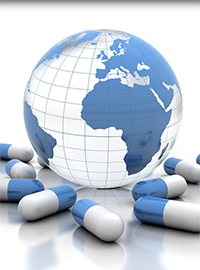| First, Do No Harm: “Buy American” Pharmaceutical Mandate Would Threaten Innovation When We Need It Most |
 |
|
By Timothy H. Lee
Thursday, April 09 2020 |
As revelations of China’s malfeasance amid the coronavirus pandemic proliferate, its calculating regime and ruthless economic model rightfully come under increasing attack. Remember how for months preceding the pandemic, China sustained deserved condemnation for its efforts to suffocate Hong Kong politically? It seems almost forgotten now. And throughout the preceding decades, China practiced a predatory business agenda, stole intellectual property and quashed all dissent. Accordingly, America and the world must rethink our collective approach and tolerance toward China going forward. In doing so, however, we must also avoid counterproductive policies that ostensibly target China but only serve to undermine American interests and consumer well-being. Currently, proposals to impose “Buy American” mandates upon our critical pharmaceutical sector provide a perfect example of that potential peril. America leads the world in pharmaceutical innovation, accounting for an astounding two-thirds of new drugs introduced to the world. That is not accidental or coincidental, but rather reflects our unrivaled protections for patent and other intellectual property, as well as our comparatively market-oriented approach vis-à-vis other nations’ more socialist models. The results speak for themselves, and American consumers are the beneficiaries, enjoying a multitude of new drugs unavailable even in other advanced nations such as Canada, Germany and the Scandinavia countries. A “Buy American” mandate, however, would jeopardize our leadership by broadly imposing sourcing requirements on medicines purchased via federal funds. As explained this week by a coalition of conservative organizations joined by CFIF and organized by Americans for Tax Reform, that would in turn disrupt pharmaceutical supply chains, trigger retaliation from allied trading partners and ultimately jeopardize American access to critical medicines: The proposal risks upending the complex medical supply chain. This supply chain incorporates numerous inputs from across the world, including raw materials, active pharmaceutical ingredients (APIs), and high precision analytical tools. These supply chains frequently contend with a number of challenges, including transportation and logistical obstacles, ensuring supply and demand are met, and alleviate stress caused to the chain due to region-specific disruptions in manufacturing or shortages. The ability of private industry to utilize a diverse global supplier base is essential to creating a healthy competitive advantage and mitigating risk. Forcibly localizing this supply chain would be a substantial undertaking, which would require finding new sourcing in the U.S. If there is no existing alternative, it would be a long process to set up an alternative. Rather than restoring U.S. jobs, the proposal would likely lead to higher prices and reduced access. While proponents of a Buy American mandate have claimed the proposal is a way to bring back jobs to the U.S., it would almost certainly do more harm than good. Under a Buy American mandate, some estimates show that the costs of manufacturing could be up to five times higher. Some might reply that this is a price worth paying to end reliance upon Chinese products, but that simply doesn’t square with market facts. Namely, China supplies just 1.2% of U.S. pharmaceutical imports, according to our own U.S. International trade commission. In fact, China trails Ireland, Switzerland, Germany, Italy, India, Belgium, Denmark, Canada, the United Kingdom, Japan, Netherlands, Singapore, France, Israel, South Korea and Austria in terms of U.S. pharmaceutical sourcing. Accordingly, a “Buy American” pharmaceutical mandate would offer a perfect example of cutting off our collective nose to spite our face. In addition to jeopardizing American consumers’ access to new and lifesaving drugs, such a mandate would also gravely threaten U.S. pharmaceutical innovators, which add over $100 billion to the American economy each year and directly support over 800,000 jobs. When indirect jobs are included, that sector supports 4 million jobs and $1.1 trillion in economic input. Moreover, pharmaceutical sector jobs pay approximately $126,000 annually, over twice the overall U.S. average of $60,000. To be sure, we should pursue policies that ensure supply chain reliability and return as many jobs to America as possible. A pharmaceutical “Buy American” mandate, however, would undermine those interests. The better alternative is to pursue the policies that made America the world leader in pharmaceutical innovation: strong patent protections, market-based policies and freedom to innovate rapidly. As America and its pharmaceutical innovators scramble to combat the coronavirus pandemic, this is the worst possible time to impose a misguided “Buy American” regulation that would hurt friendly nations like Ireland or Israel, invite destructive retaliation, disrupt supply chains, undermine innovation and delay consumer access to new medicines. Our nation’s leaders must follow the ethical adage, “First, do no harm,” and reject a “Buy American” pharmaceutical mandate that would undermine innovation precisely when we need it most. |
Related Articles : |
























